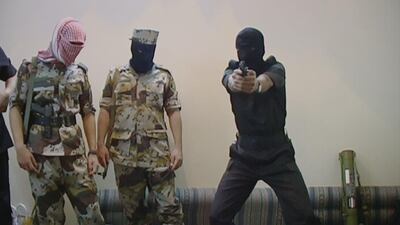What makes an Al Qaeda suicide bomber? Is it a fanatical sense of ideology and self-sacrifice, a suicidal mindset or a twisted desire to avenge the wrongs of a modern superpower with the killing of civilians? A new documentary, Path of Blood, seeks to examine these questions using an extraordinary trove of video footage recorded by extremists themselves.
The producers negotiated access to almost 500 hours of film seized by Saudi security forces from Al Qaeda cells operating in the kingdom.
The result is an inside view of the training and indoctrination of young men who are tasked with conducting a string of high-profile bombings in Saudi Arabia in the years after 9/11.
Understanding the mindsets of the young men
It shows them larking around in wheelbarrow races at desert training camps, as well as the out-takes from martyrdom videos, as the young recruits fluff their lines, juxtaposed with the bloody aftermath of fatal attacks.
Rather than the pronouncements of propagandists or leaders such as Osama bin Laden, the aim was to understand the mindset of the young men tasked with carrying out attacks, says Jonathan Hacker, the film's director.
"One of the things I wanted to try to do with the film was to humanise these kids, because I felt this footage gave me an opportunity to go behind the scenes with them," he says. "I thought that was something incredibly important. We have to try to reach out and understand their psychology and belief structure."
The footage comes unvarnished, without the analysis or editorialising of talking heads or narrators other than the words of Al Qaeda publication Voice of Jihad. It leaves viewers with a portrait of young men looking for adventure, motivated more by camaraderie and bonds to fellow recruits than by any understanding of the extremist ideology.
The footage follows Al Qaeda’s war inside Saudi Arabia from 2003 to 2009, but focuses on the early years when truck bombs reduced apartment blocks to rubble and terrorists ransacked office buildings searching for Westerners to target.
It opens with one of the most revealing scenes – reminiscent of Chris Morris's satirical British movie Four Lions. A young operative, Brother Ali, his face uncovered, is flanked by masked gunman. "God permitting, these are the final moments of preparation before the operation," the narrator says. "These are the humble, radiant faces of men devoted to their religion."
Brother Ali will be the driver in an attack. He is asked whether such an operation is a sin. Brother Ali pauses before saying he does not understand the question. The unseen interviewer asks again: “It’s said that the bombing campaign is a sin against Islam and Muslims. What’s your response?” Ali looks uncomfortable, before saying, “I wasn’t briefed on this,” prompting giggles around the room.
Learning what's needed for deradicalisation
For analysts such as Jesse Morton, who once ran a website from his New York home that served to recruit young men for Al Qaeda, but who now spends his time working on deradicalisation, it is a telling vignette.
"A lot of people say that the ideology is the driving factor, but when quizzed and searching for ideological justification for blowing oneself up, it is apparent that the individual can't even place the evidence that has been indoctrinated in him to try to motivate him, to justify the attack," he says.
He adds that such an understanding had important lessons for how best to turn recruits away from extremism. It required not just tackling the propaganda and ideological teachings, but also an entire movement.
"They have an entire ecosystem that is evident in the film and has only developed since then," he says. "It is a culture of eating together, a culture of playing together, it's a culture that targets the children – you can hear a child in the film after the American is beheaded."
Having introduced the recruits as human figures, joking around as they paint their vehicles in camouflage colours (sample quote: "It looks more like a cow."), their acts of brutality take on an even more shocking tone. Paul Marshall Johnson Jr, an American helicopter engineer, is shown being interrogated and tortured. The screen goes blank amid sounds of struggle and someone gives the order: "Bring me his head." A few seconds later, a child speaks, saying: "That's my daddy's knife."
Click to watch the trailer for Path of Blood:
Other scenes show children dressed in military fatigues, practising tumbles while clutching toy guns. But Hacker says it would be wrong to think of terrorists training their children; it was more a case of an all-encompassing belief structure that dehumanised enemies. "They don't see this as indoctrinating the children," he says. "They see it as normal. And they see what they're doing as holy. If the children are around, it is because they believe so profoundly what they are doing as sanctified by religious prophecy and they think it as an honour for their children to be around."
It is almost like young kids attending Roman gladiator battles, he says.
A 2015 book, also titled Path of Blood includes further details beyond the scope of the film, since the documentary's aim was to tell the story of a specific time and place. "For Saudis, it came as a huge shock for them when Al Qaeda declared war on their government and targeted Saudi citizens," he says. "I certainly believe that experience jump-started a lot of soul searching – perhaps we're seeing the fruit of that now."


